It’s a sad day whenever you find yourself reading articles like these. But that doesn’t mean you can’t walk away with some helpful tips on how to make some tough decisions. Let’s start by asking the tough question: Is it time for me to break up with my Demand Generation agency?
“The SaaS industry is built on relationships. And so, breaking them can be tough – especially in the incestuous world of Silicon Valley where high value contacts often move from one account to another.”
But to answer this question, we’re going to need more than just some numbers and calculations. This question requires both quantitative and qualitative analysis.
Let’s get into it.

As I mentioned, it’s tough to ask the breakup question. Understandably, it’s even harder if you don’t know what type of specific marketing agency you’re working with. Let’s clear a few things up first, as there are quite a few boxes that need to be checked.
To make things easier for you, we’ve gone and built out this quick questionnaire for you to gauge if your current demand generation agency is serving your needs.
- Do they help you with financial modeling for goal setting?
- Are they focusing on SQLs and revenue? Or just MQLs?
- Are they a strategic partner? Or are they just an execution partner?
- Do they consistently test new hypotheses?
- Do they ask for more budget to test new ideas?
- Do they engage with other stakeholders within the business like product & sales?
- Do they have good knowledge sharing between different accounts and have experience in my niche?
- Do they have transparent reporting?
- Do they focus on elevating your brand? Or just comfortable with the status quo?
- Do they focus on 1st party data? Or just rely on 3rd party data sources?
- Do they focus on the customer to guide strategy? Or keywords and traffic?
Keep in mind that the question of whether or not to part with your demand generation agency goes deeper than the list above.
However, the above list will help enlighten you to how deep your agency partner is really diving into your campaigns.
For example, understanding whether or not your agency is asking for new budget and testing new ideas/hypotheses is more than just a checkbox – it’s a litmus test on what your agency is doing to drive actual new results and growth for your business. You don’t want a partner who simply pushes the buttons and checks boxes – you want a strategic partner who helps grow your business and acquire new customers.
Questioning how transparent your agency is with its accounts (as well as reporting back to you) should also yield some insights into how confident they truly are in the performance and creativity of the work you’re paying them for.
And lastly, but surely not least, ask why your agency chooses to target MQLs vs SQLs and why it relies on third party data instead of curating a personalized TAM list for your business. They might not even have an answer for you. The truth is that many demand gen marketers rely on these legacy tactics simply because they believe they have to.
What To Be Wary Of
Many Demand Generation agencies these days have fallen victim to the empty promise of MQLs.
What is that promise exactly? To solve the problem of aimless performance of Growth Marketing with strategies and metrics that point directly towards growth.
On the other hand, more customer-led strategies properly align your financial modeling, goal setting, and strategic pivots towards generating more customers. Not clicks, not conversions, not engagements, impressions, or demand – but actual customers.
Regardless of if they’re hitting their NSMs, many Demand Gen agencies will provide strategies that falls victim to the below three fatal issues:
- Reactive, not proactive communication
- Poor data tracking and poor MQL quality
- Poor indicators of success
Your SaaS brand is growing, but your demand generation agency can’t scale effectively or efficiently (with predictability) while focusing on the wrong metrics. This is why you need a strategy that focuses on what really helps grow your business. Just take a look at the example below for more context.
This is what happens when you shift from an MQL-driven Demand Gen strategy to an SQL-driven customer-led strategy.
What Exactly Is Demand Generation?
So what is included in Demand Generation, exactly?
Demand Generation covers the entire range of B2B marketing and sales initiatives that generate interest in your company’s product or service. If you’re trying to generate demand for your product/services, no matter how you’re doing it, you’ll find yourself under the Demand Gen umbrella.
This includes a long list of different marketing and sales tactics – both digital and non-digital – that we could waste hours listing out. But for the most part, demand gen practices fall under the process displayed in the graphic below:

In terms of the top of the funnel customer experiences for Inbound marketing, this is where your traditional content marketing and SEO strategies come into play. Here, Demand Generation agencies attempt to boost brand visibility by capitalizing on search engine inquiries that they hope can turn into MQLs.
Other traditional inbound tactics like Paid Media across different channels and platforms help agencies capitalize on demand and convert these passive users into “qualified” leads. Then with email marketing and marketing automation systems, the hope is that they can nurture these one-time exposed MQLs into paying customers.
Of course these strategies can quickly become convoluted and complex when you stop to consider the length of the SaaS customer journey. The complexity of the modern day B2B buyer’s journey makes for quite a lot of cross-platform content creation and promotion to be handled just to close a single lead.
If you’re working with an agency that is handling anything you see on the above list – or anything tangential to it – you’re most likely working with a Demand Generation agency.
Why B2B SaaS Brands Usually Hire A Demand Gen Agency
Let’s get into the real nitty gritty: What exactly were you looking for when you first partnered with your agency? If your head was in the right place, it should really boil down to one of four options:
Option 1: Expertise
It’s true that some of us are great product designers and others are great marketers of said product. You simply might not know how to best connect with your end customer. Especially in today’s nuanced days of multi-platform SaaS marketing campaigns, complex Marketing Ops, and more, knowing you can rely on an expert to help grow your brand is worth the investment.
Option 2: Strategy
Maybe you’ve simply hit a ceiling when it comes to your marketing performance. You may have looked at it from every possible angle you can think of – but you just need the expertise and strategic eye of an outside party to help spice things up and reinvigorate your brand. Here, knowing the difference between an agency that can provide actual growth and projected scale, as opposed to just rocking the boat for rocking’s sake, is incredibly important.
Option 3: Scale
As you grow as a business, your marketing needs grow as well. We all like to take pride in the grassroots origins of our startups, but there comes a time when you need to focus on marketing tasks on a level beyond your average email lists and marketing campaigns. This is where investing in a skilled and tactful partner can be a strong asset.
Option 4: In-House Debate
If you’ve partnered with an agency, you’ve already decided that the pros of partnering with an agency outweigh those that come with relying in-house. The costs of investing in a full-time hire to train and onboard is far more of a leap of faith than trusting an industry-vetted SaaS agency.
Taking a leap of faith on poor in-house hires can result in some particularly painful marketing goodbyes:
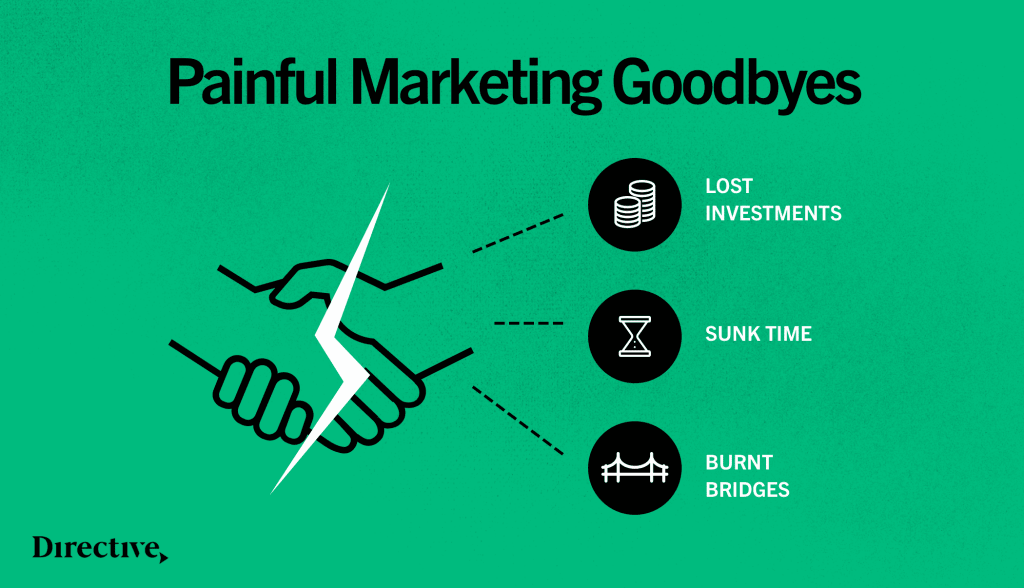
Demand Gen agencies claim to have a unique proposition of being able to create tangible growth from the previously aimless results of Growth Marketing.
Now that you’ve hopefully identified some of the reasons behind your hiring your current marketing agency, let’s get into the reasons why you might want to leave them.
How Is A Demand Gen Agency Different Than A Traditional Digital Marketing Agency?
As opposed to traditional marketing agencies or Growth Marketing agencies, most Demand Gen agencies focus on optimizing towards MQLs, specifically.
Whereas ordinary marketing agencies focus on engagement throughout the customer journey, Demand Gen agencies will prioritize campaigns towards the lower third of the funnel — where qualified marketing touches can be converted to leads. Now, not all Demand Gen agencies focus on MQLs. But the good ones will at least take it one step deeper to focus on the main three pillars of Demand Gen’s origins:
- lead generation
- demand capture
- pipeline acceleration
The point of Demand Generation is to leverage the seemingly disparate engagements of Growth marketing and use them to qualify different leads as conversion ready or sales ready.
And thus, the MQL was born.
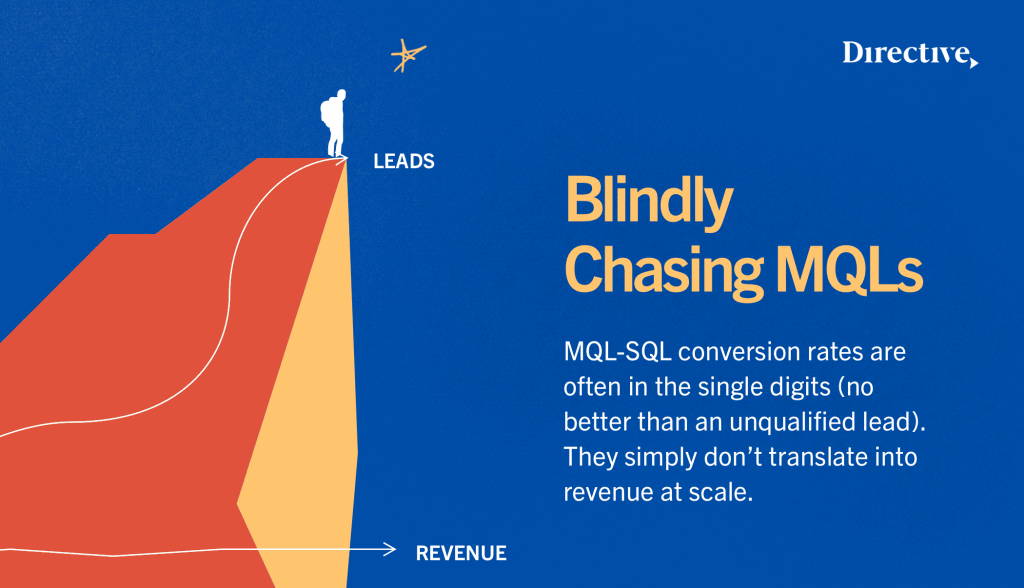
Demand Gen agencies preach that the MQL – the marketing qualified lead – is the holy grail of all marketing campaigns.
But here’s the thing: They’re wrong.
The sad truth is that with the extended customer lifecycle of the average SaaS end-buyer, MQLs simply don’t translate to predictable revenue.
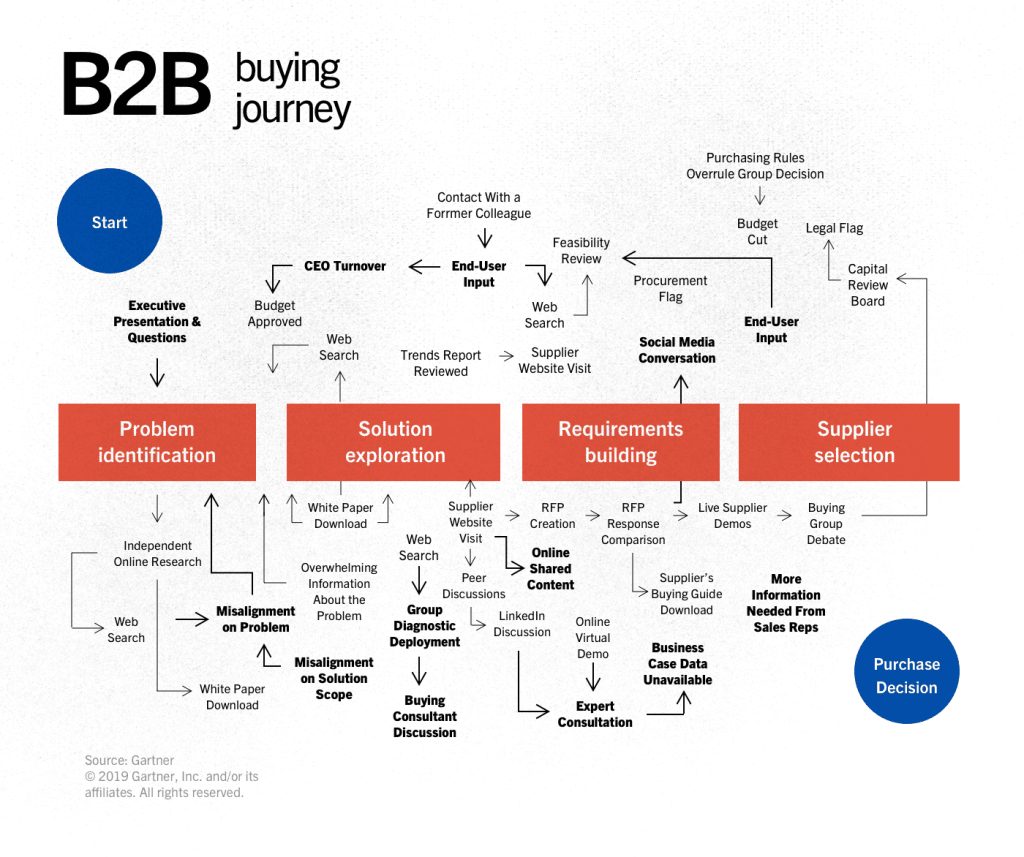
And isn’t that what every CEO wants? Predictable revenue and growth.
Regardless of what method you subscribe to or agency you partner with, if you can supply that I’m sure your decisions will be affirmed.
Demand Generation Strategy: Framework and Approach
Even if they’re hitting all your agreed upon goals and improving metrics across the board, there’s still something missing from every Demand Gen agency’s primary focus: customers.
The fact is that the MQL that Demand Gen prioritizes above all else simply doesn’t translate to SQLs and revenue.
Think about it – When was the last time you spoke to your sales team about what they think of calling “leads” after they’ve downloaded some eBook? These calls almost never turn into sales! The bulk of people converting on free how-to content aren’t the ones who are going to be buying your software.
“The entire Demand Generation framework seems to be built upon filling the funnel with MQLs and then praying and hoping that enough of them eventually convert into customers.”
Why would you want to put so much time and effort into a campaign that still leaves you crossing your fingers at the end of the day?
When you take a moment to consider it, even the team structure of most Demand Gen agencies (and their strategies) has a critical drop off after MQLs. Let’s take a look at a traditional Demand Gen team framework for an example:
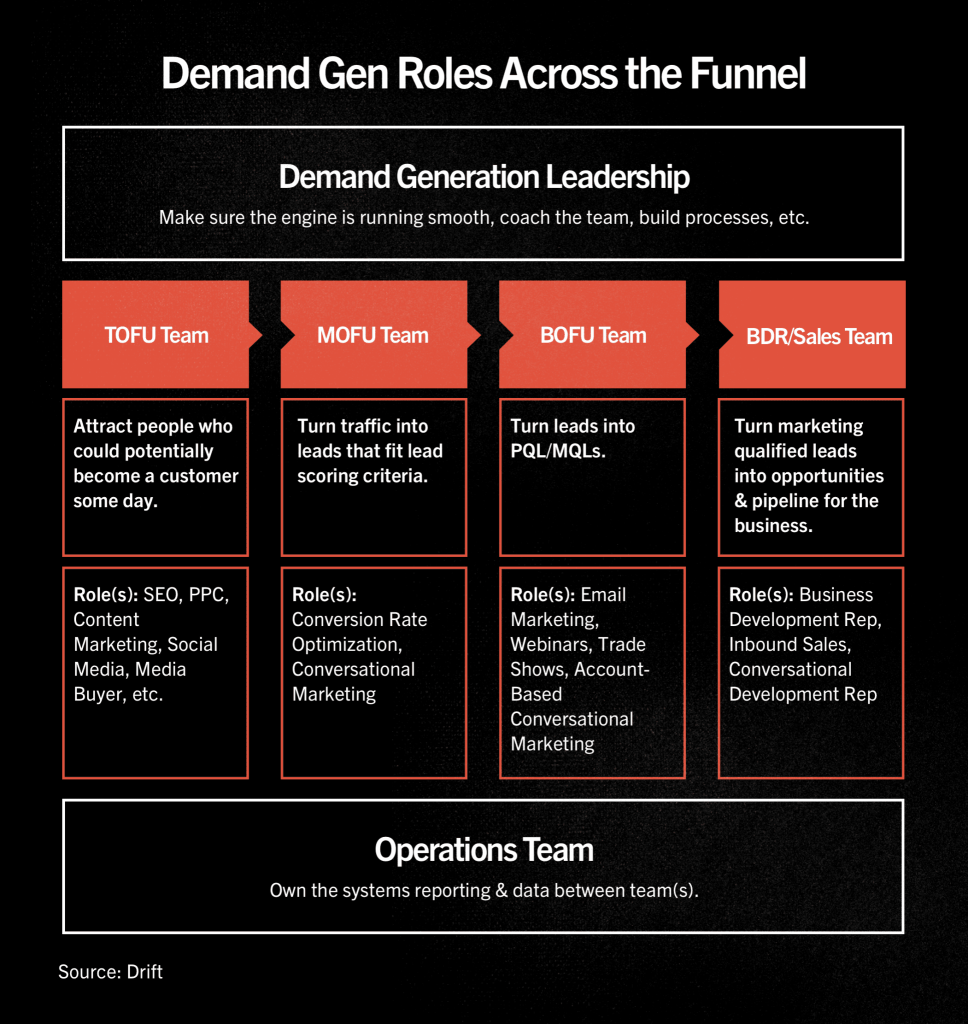
You can clearly see the segmentation between each department. Each has its own KPIs and NSMs completely disconnected from the rest. Each stage of the funnel suffers critical amounts of drop off because at each stage, marketers are left to clap their hands together and hope that they hit their numbers.
Demand Gen’s misalignment makes goal setting and financial projection nearly impossible.
Why Demand Generation Agencies Sometimes Miss The Mark
So why exactly do Demand Generation agencies often fall short? The answer is quite simple: Your product is not for everyone – and that’s okay! Even more so in the SaaS space.
Targeting such a sophisticated audience with such a uniquely long customer lifecycle means that you naturally have to change your marketing strategies as well.
“Mistakes with the [marketing-sales] handoff lead to lost time and money and could even jeopardize a sale. Because there are gray areas of ownership and contention, [it’s one of of the biggest] challenges that marketers face .”
“If you are getting this kind of reporting and don’t know the exact CPA (cost per acquisition) or CPL (cost per lead), you are probably working with an agency who has no idea how to manage [your campaigns].”
And just like how Demand Gen agencies rose out of the need to give more tangible direction to Growth Marketing, it looks like there’s a new evolution on the way.
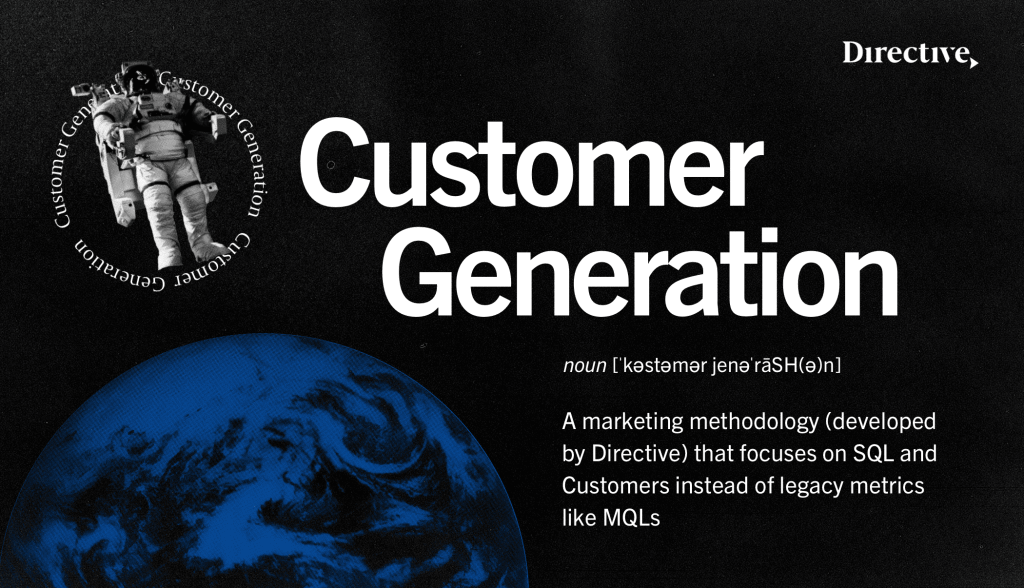
Customer Generation reminds us that even though we’re in the B2B industry, at the end of the day, we are still talking to people. People react to emotional experiences, and we should be marketing as if we are B2C. At the end of the day, we all want to connect with customers.
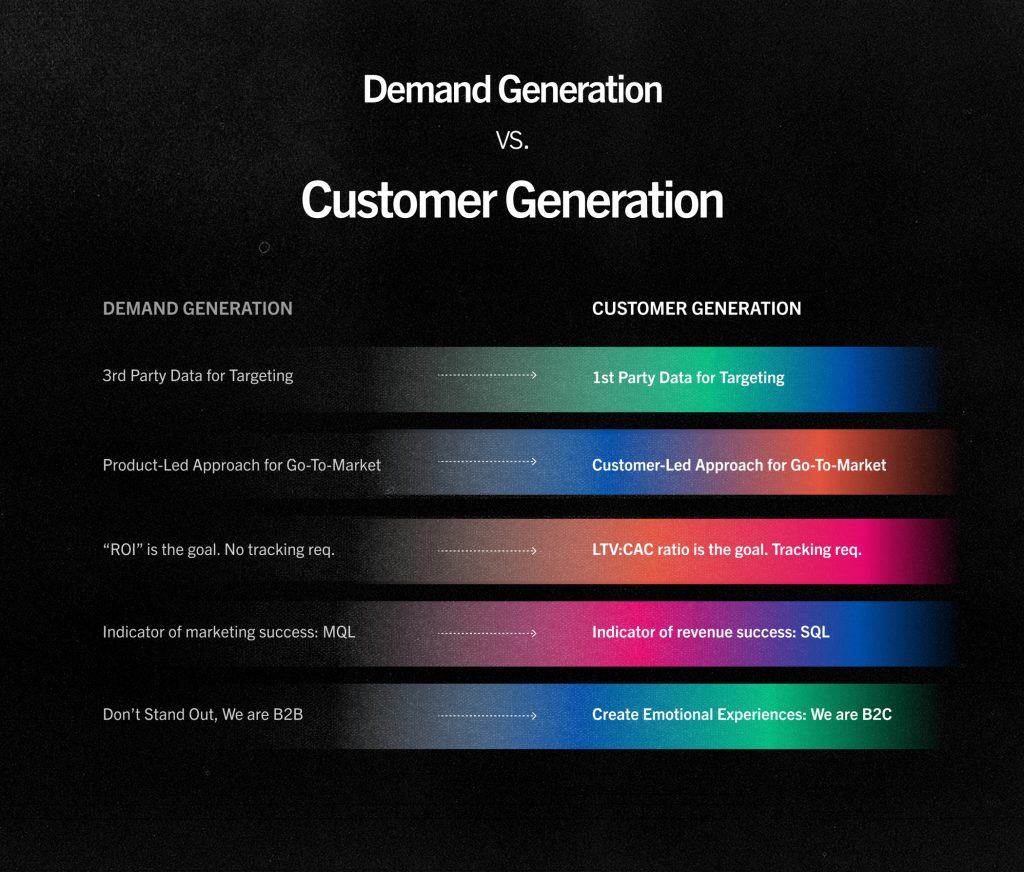
While we all want demand for our product or service, what truly matters is customers and revenue. It’s time you break up with the agency that focuses on the former to partner with an agency that grows the latter.
In Conclusion:
Isn’t it time you partner with an agency that is dedicated to growing your business more than their own? Demand is nice, but it isn’t what pays the bills and keeps the lights on.
At the end of the day you want an agency partner that helps make you more revenue, not one that boosts vanity metrics. If you’re looking to get serious about your growth and radicalize the candor of your marketing optimization, you know where to find us.
Start Generating Customers Today